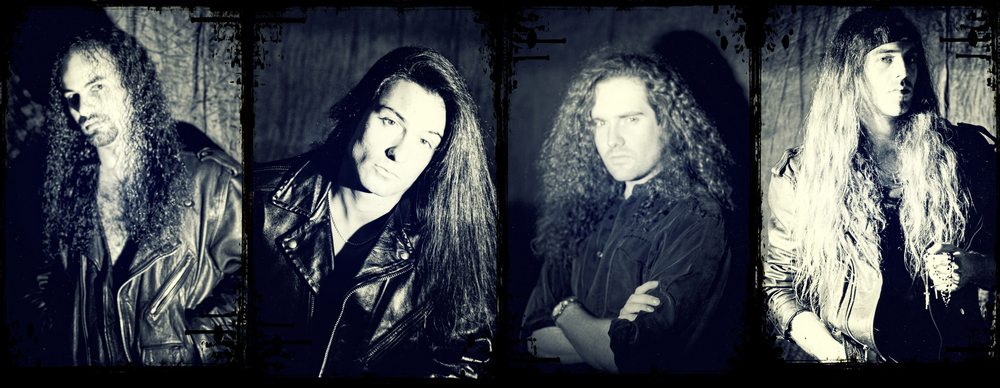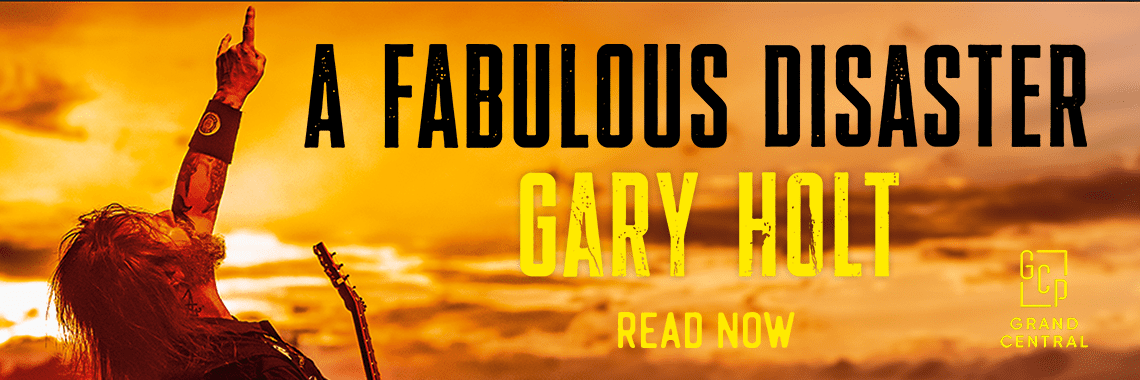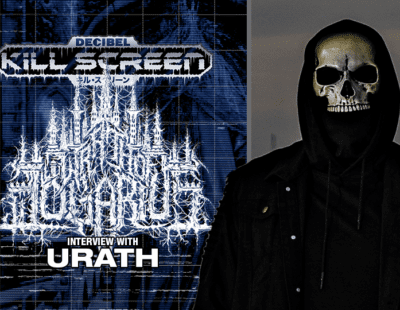
It should come as absolutely no surprise to anyone reading this that someone who works at Peavey in 2016 played in a metal band in the early ‘90s. Hell, it’s probably a job requirement. Still, I’m endlessly charmed with that fact and think of it often while listening to Dead of Winter, a new reissue/re-recording of old demo material from Orlando, Florida’s Damien Black, who in their ranks feature bassist Scott Mire, now Program Manager of Engineering at Peavey. But back in 1992, Mire was laying down some old-school, traditional, slightly prog-tinged metal with his Damien Black bandmates; they only released one demo back in the day, and Dead of Winter brings a slightly revamped version of it along with unreleased tunes to 2016, care of Steel Gallery/Arkeyn Steel Records. We pulled Mire away from his day job for a few minutes to get the scoop.
Give us a bit of a history on this recording: when was it originally done?
The songs on the current CD were originally recorded in two sessions. The first four were recorded in 1992 and released as the Black Reign demo. The remaining four were recorded in 1994. The second batch of songs were intended to be a follow-up demo release. I have always had the masters for the original demo, but the second batch of masters were lost when the studio was sold to a new owner. Through a truly astonishing chain of events, the second masters were found and ended up in my possession in 2001 or 2002.
Why did you decide to release this album now?
The Greek label Steel Gallery had contacted me many years ago about releasing a Damien Black CD. At the time, I didn’t have all of the masters, as I mentioned. It wasn’t until 2014 that I really had the bandwidth to focus on this. I contacted the label and we got to work. Everything happens when it’s supposed to happen.
Why did you decide to re-record some parts?
I knew I wanted to start with the original master tracks and use as much of it as made sense. At the same time, I wanted to have a more modern sound with the drums and bass. There also were some guitar solos that needed to be replaced. Also, I wanted to add vocal harmonies that we didn’t get a chance to record during the demo recordings. I think every band thinks they could do everything they record better; I know I do. Luckily, in this case, I had the time and opportunity to go back and polish things up.
It has a very ’80s, very Queensrÿche feel to it, but it holds up remarkably well. How do you feel the material has stood the test of time?
Well, I’ll take the Queensrÿche reference as a huge compliment. I think in the case of Damien Black, the primary Queensrÿche influence is heard in the vocals. In the early ’90s, this was a huge problem for us. Today, I don’t even think Geoff Tate sings like Geoff Tate, so we’ll gladly fill that void (laughs). As far as the songs themselves, I’ve always been aware of the fact that I enjoy writing hooks as much as I love writing heavy music. I think you can have both. I’ve always wanted to write songs that people remember. Having said that, I think the hooks help the songs stand the test of time. Whether it’s written in 1916 or 2016, a good song is a good song.

How does it feel for you when you sit back and listen to these songs again?
I tend to have a love/hate relationship with songs I’ve written and recorded. By the time I get out of the studio, I’ve spent so much time with the songs that I need distance. Also, it takes a long, long time for me to stop noticing mistakes in the recording, or focusing on parts that could have been better. But, over time, you become so removed from the process of creation that you start to hear the songs just like everyone else does. In this case, I think I was far more excited about the songs during the creation of this release than I was when they were recorded for the original demos.
You released a demo tape in 1992, but never an album. How does it feel to see this released now? Did you ever think you’d see a Damien Black CD released in 2016?
In the early-to-mid-’90s, I was told by every label, management firm, magazine reviewer, club owner, and most everyone I knew that no one wanted to hear a band playing this music. It was the worst case of being in the wrong place at the wrong time I could imagine. Practically every industry contact I had disappeared the day after “Smells Like Teen Spirit” hit the charts. On top of that, the band itself was dealing with members that had very serious chemical problems. I truly believe that if that band had signed in 1992, someone would have died. It was that serious. Although it wasn’t going to happen at the time, I’ve always known that I would get this material out one way or the other. I think the songs deserved to be released and no matter how long it took, I would have made it happen. I’m glad that I had enough sense to hold out until I could do it right and that Steel Gallery allowed me to take the time I needed.
Are there plans to get the band together to be active again?
Well, the “band” exists as a recording entity for the time being. We have enough material for a second release, which we will start working on soon. I don’t see a touring band happening any time soon unless something amazing happens with this release. It is really hard to make a living in this business to begin with, but in a full-time band, everyone involved has to make a living. So, the situation has to be right for that to happen. When I was in my early 20s, it was ok to live in the band’s rehearsal space… today, that shit is not happening (laughs).
Your guitarist Bob [Rossi] has played with Rob Rock; so has Bobby Jarzombeck, who plays with Fates Warning. Somehow, listening to your album I can’t help but think this must be relevant. How is this relevant?
That is only relevant because every metal band’s merit is measured by its degrees of separation from Black Sabbath or Deep Purple. In this case, I played with someone who played with Rob Rock, who played with Rudy Sarzo in Project Driver, who played with Ozzy Osbourne, who was in Black Sabbath. Four degrees of separation from Black Sabbath. That shit is real, son (laughs). A number of former members of Damien Black went on to play with really great bands. It’s a bit surreal to see one you played with on tour with Pantera and Slayer. I always tried to really support anyone who was ever in the band. One of my biggest influences was Crimson Glory and, after Damien Black, I had the absolute pleasure of playing with Ben Jackson for a short time in a band called Parish. I think anyone with ears can hear the Crimson Glory influence in Damien Black.
Order Dead of Winter here.






